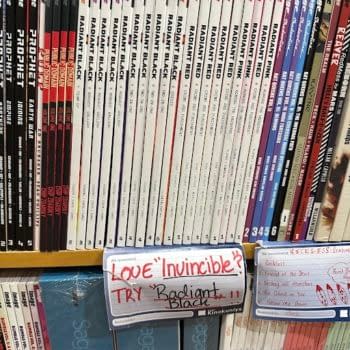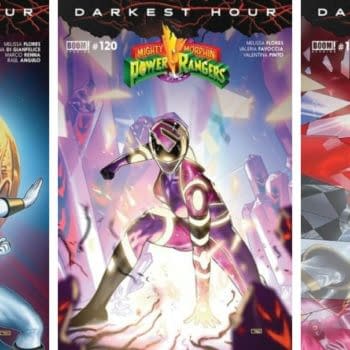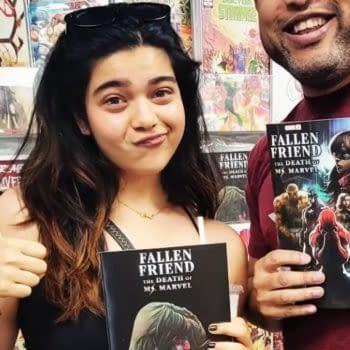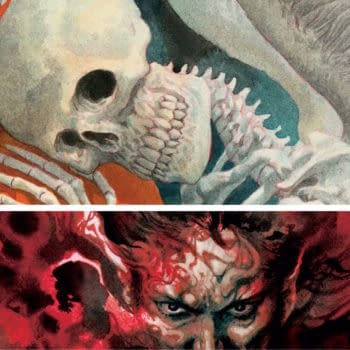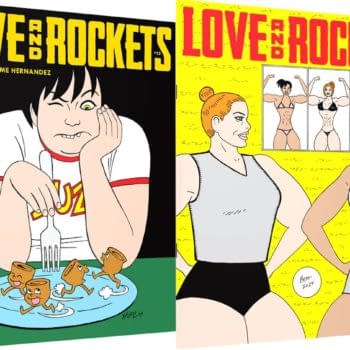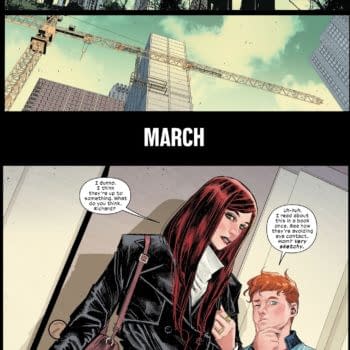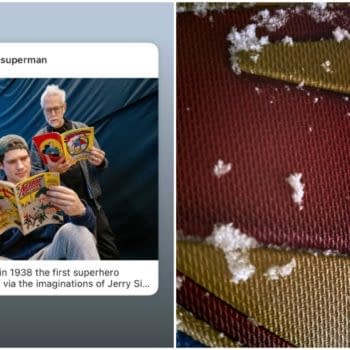Posted in: Comics | Tagged:
"When Their Sales Go Down, They Will Abandon You" – Run DMC's Darryl McDaniels On Comic Book Publishing
Peter G wrote from C2E2 for Bleeding Cool,
Darryl McDaniels is a native New Yorker who changed the face of pop culture. With his friends Joseph Simmons and Jason Mizell, they created the legendary hip-hop group Run DMC. McDaniels also became a huge advocate for adoption, testifying in the New Jersey state league for adoptees to access their original birth certificates, founded a summer camp for foster kids, and is on the board of directors for the organization Children's Rights, which monitors child welfare systems around the country. Now, he's out to make a new mark on the world with his comic book imprint, Darryl Makes Comics. (He also has great taste in T-shirts.) He was at C2E2 and kindly answered a few questions for me.
G: After all your success in the music industry, what made you want to jump into the comic industry?
McDaniels: My first love of this wonderful existence on Earth, before hip hop came over the bridge from the Bronx and changed my life, was comic books. All I did was read and draw comic books. I bought my first comic book back in kindergarten. I was a great student, so by second grade, I was able to read what was going on. And then it became, read the comic book, and then try to draw the characters. I started with stick figures. Then I graduated to tracing paper. By third grade, I didn't need the tracing paper anymore. So my whole existence before hip hop is comic books.
Comic books set me up for my success in hip hop. At first, I never wanted to be in show business. But when hip hop came to Queens, I was like, "You can tell stories over music?!?" So my imagination, all the creativity, all the storytelling from comic books, I was just pretending to be THE MOST POWERFUL ENTITY IN THE HIP HOP UNIVERSE! I would become THE MIGHTY KING OF ROCK! So that's how I was writing my rhymes. So comic books are still in me. I was able to utilize those aspects to be successful in hip hop.
G: I have to ask — were you like me as a kid, in that, on the last day of school, you went around to all your teachers to recover the MAD magazines and comics they had confiscated from you during the year?
McDaniels: (hearty laugh) YES! All of that, yes! They would take them weekly! I used to doodle in aaaaaaaall my textbooks, My teachers actually thought something was wrong with me, I got pulled out into the hallway a million times. The teacher was like, "…uh…Mr. McDaniels, those books have to come back at the end of the year. Other students are going to need them next year. Stop drawing in all of the textbooks." Every time, I would do the thing where you put a comic book inside the social studies book, and STILL I'd get caught! And at the end of one year, one teacher didn't want to give me my comic books back. When he saw that I was ready to kill myself, he gave them back — he was like, "DAMN! That's crazy!" But yeah, I was one of those kids.
I went to Catholic school my whole life. So comic books were also a release for me, because going to Catholic school, you wore a uniform, you carried a big school bag…so the other kids in the neighborhood, the public school kids, were crazy. They were like, "You go to Catholic school? You're family's rich, because they pay for you to go to school." I got picked on, I got teased, I got my lunch money stolen. So when I was in school, it was beautiful. I loved to read and write, I loved the first day of school, I loved new textbooks. But when the school bell went off at the end of the day, I was so traumatized, because I had to walk home. But when I made it home, after I did my homework, I would just sit in my room and read comic books. Comic books took me away from this traumatic, troublesome universe of trying to be a little kid growing up on Planet Earth. Comic books took me away, empowered me, educated me, and the comic book world was the world where everything was all right.
G: It's kind of an interesting time for comic books. The spin-off media is going crazy, you got movies and stuff like that. But sales are also down. Do you think this is the worst time to be in comics, or is this the greatest opportunity?
McDaniels: I think it's the best time to be in it. We know sales are down. My book came out two years ago, and I think it was about my fourth comic con (I think it was in Atlanta), this is what happened: a father who loves Run DMC, who played Run DMC ever since his kids were born — they were, like, 9 or 10 or 11 or 12. And you know, when you get in a car with dad or you're at home with dad — he's playing Run DMC, LL, and the Beastie Boys. The kids saw that the comic con was coming to Atlanta, and they went up to their dad and said, "Dad! Dad! We want to go to comic con!" And he was like, "I'm not going to a comic con!" Then they saw that I was one of the guest speakers doing a panel there. "But DMC is going to be there!" "All right, we're going to the comic con!" Just because their dad wanted to meet me. He came to my panel and heard me speak about how I was into comic books before hip hop, comics made me a good student because I was reading, and he told me, "I totally abandoned my love of comics because I thought it wasn't cool anymore. And then I see you standing there, telling me that all your creativity and artistic abilities on the microphone are from the same comics that I used to read. I'm getting back to collecting my comic books." So it's a good time for me.
Also, the whole idea of the geeks and nerds was underground. Because only we know how dope they are. Now? Mainstream media, these corporations, and even hip hop, have jumped on board. Look, the movies are great, as long as they do them right. But we don't need the movies. There's people who go to the movies just for the special effects. They're not going out and reading afterwards. I've been reading Captain America since 1969. So I don't need Hollywood to show me how great our culture is, the geeks and nerds and comic books and Star Wars and all that. That being said, my two buddies who convinced me to do a comic book said, "Yo, D, you're kind of needed right now." I was like, "What do you mean?" I didn't want to do a comic book at first. They said, "You should do a comic book." I said, "No." They said, "Why not?" I said, "I don't want to be another rapper, just because I got a hit record, thinking I can do something." They were like, "That's honorable." What we need right now is to make sure anything that is cool and underground and real doesn't get polluted and diluted once it's commercialized. Comics been here forever. All of us in here, all the cosplay folks, all of the Star Wars heads, all of the Powerpuff Girl fans, we don't need Hollywood to come mess it up. But it's a good time because, what I'm doing now is, when you look at rock and hip hop and even Hollywood now, everything is negative. It's accepted now. So my role is, the little kid that loves Fred Flintstone and Popeye and Captain America, but don't want to talk about it because he thinks he's not cool because he's not a Crip or Blood, that's my role in this — to legitimize it and to make sure that corporate America does not commercialize this. They all come up in here, and put everything up on their big billboards and this and that. And then, when their sales go down, THEY WILL ABANDON YOU. So I'm here at a good time because we need a catalyst to get back to the actual books and the graphic novels and everything else. A lot of people are going to see Captain America and Superman because they wanted a movie. But when you come to the comic con, you come to the comic book culture. That's what's missing.
G: Given how comics can use some diversity, do you see yourself opening doors?
McDaniels: Yeah. The "diversity thing?" A lot companies jump on the diversity bandwagon because they are doing it for commercial reasons. They go, "Let's do a black superhero and get all the black people on board," or "Let's do a Muslim superhero because of all the Muslims." When I did my first issue, organically, in issue 2, DMC is not the only superhero in the DMC universe. I don't want a million issues of just me. In issue 2, we introduce the next superhero in the DMC universe, a 16 year old Latino girl. It was just that way — when we created the things, when we created the storylines and the characters and the scenarios, her character jumped off the pages at us. And then, in number 3, there's another female hero. The diversity has to be organic, and what I mean by that is, my role is this — when people look at hip hop right now, they think you're only supposed to see bitches, hoes, guns, gangbanging, and this and that. I come from an era when hip hop was Run DMC, the Beastie Boys, LL Cool J, De La Soul, it was diverse. Female rappers like Queen Latifah, MC Lyte….
G: It was talent, not looks.
McDaniels: It was talent, it was personalities that were relatable. For those little girls, for the dyslexic people, this and that, these are the things that I'm gonna utilize as superheroes because, what you lack, that people consider abnormal, is actually a strength for you. My role is to, not legitimize the diversity that's needed for little girls and black people and that, but to make it universally accepted. You're not supposed to do a crippled superhero to make crippled people like you. You do a crippled superhero to get the ones who can walk normal go, "Man, that's bad ass!"
Do you like cartoons? Who doesn't? Peter G is still doing strange things in the name of art, and his new animations, like his cult series One True Pairing, can be viewed on YouTube at Sine Timore Animation Studios.







